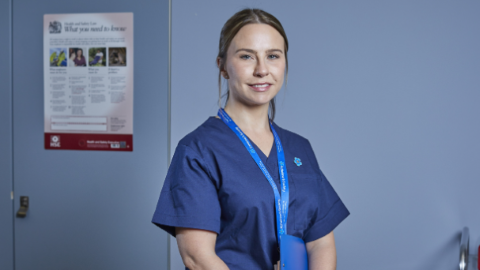Take part in dementia research
Research studies offer hope that we can one day end the devastation caused by dementia – and research is only possible thanks to the people who take part.

What is dementia research?
Dementia research aims to improve our understanding of dementia diagnosis, treatment and care. It helps researchers answer the most important questions about the disease.
You can find more information on the two main types of clinical research below:
I would like to underline how easy and rewarding it is. You are doing something good, not only for yourself but possibly for future generations.
Jean, research participant
Taking part in research
Many people find that taking part in a clinical research study is an interesting and rewarding experience. Find out more about what to expect below:
Everyone has their own reasons for wanting to participate in research, some of the reasons people have shared with us include:
- Wanting to help make a difference to the future of treatment.
- Accessing new devices or therapies that might improve symptoms and quality of life.
- Spending more time with healthcare professionals.
- Having access to information, tests, support that may not otherwise be available.
- To learn more about their condition and its treatment.
- Having a sense of purpose and control.
You can read stories from people who took part in research on the Join Dementia Research website. Find out about their experiences and what first inspired them to take part in a research study.
What’s involved in each study will depend on the questions researchers are trying to answer. Researchers will explain what's involved in their study before you decide if you want to take part.
Studies may take place in a hospital, GP practice, or other health centres within a community. Depending on the study, some can also be done at home, online or by telephone.
Below are some examples of what you might do when participating in a study:
- Taking memory or thinking tests (also known as ‘cognitive’ tests), where you might need to answer a set of questions, describe an image, or repeat words from memory
- Having brain scans in a hospital setting or clinic
- Recording your symptoms
- Giving blood samples
- Taking new medication
- Staying overnight in a hospital for monitoring
- Changing parts of your lifestyle, such as exercising more
- Trying out new foods or supplements
- Filling in questionnaires or surveys
- Participating in talking therapies
- Testing new technology or wearable devices
Anyone who is a UK resident and over the age of 18 can register their interest in taking part in dementia research.
Each study has its own rules and guidelines as to who can take part. This will depend on the type of study and will be based on things such as age, the type and stage of a disease, previous treatment history, other medical conditions the person has, and other mediation the person is taking.
It’s always your choice whether to take part and you can change your mind at any time.
Before taking part in research, potential participants will receive detailed information about the study. This will include the risks and benefits associated with participating, as well as information such as which procedures are involved. The research team will go through this with you, and you will have the chance to ask questions and have these answered to your satisfaction. This will help you make an informed decision whether or not you would like to take part.
How can I find a research study to join?
When you register your interest, the information you provide will be used to match you to studies you may be able to take part in, both online, nationally, and in your local area.
The service connects people registered with dementia researchers who are looking for people to join their studies. You can review your study matches once you register and then it’s your decision whether to take part.
The National Institute for Health and Care Research (NIHR) also has a service called Be Part of Research, where you can find clinical studies that you could be eligible for.
Join Dementia Research
Interested in getting involved in dementia research? Visit the Join Dementia Research website to find out more about how you can take part.





Clinical trials, also called ‘interventional trials’, involve active testing, for example testing a new drug. They are a way to test new interventions that aim to prevent, diagnose or treat people, or improve their care and quality of life.
Clinical trials are the main way that researchers can identify whether a new approach, such as a new drug or a device, is safe and effective in people.
A well-designed clinical trial will gather high-quality evidence about which treatments or approaches are most effective. The results of clinical trials often guide decisions about treatment for healthcare professionals, regulatory bodies and people with dementia.
Observational studies, on the other hand, are about observing without interfering, for example monitoring people who smoke over a period of time to see how it affects their health.
Observational studies collect information about a group of people, without changing anything or deciding on treatments. This is different from clinical trials, where people are placed into specific groups, such as treatment and comparison groups.
Researchers could, for example, look at what factors might increase a risk of developing dementia – without interfering in participants daily lives.
Observational studies may include surveys and questionnaires or using existing records and information, such as hospital records.
This type of research can help us better understand how dementia affects people in real-world situations. They are an important way of identifying questions that may be better answered by future clinical trials.